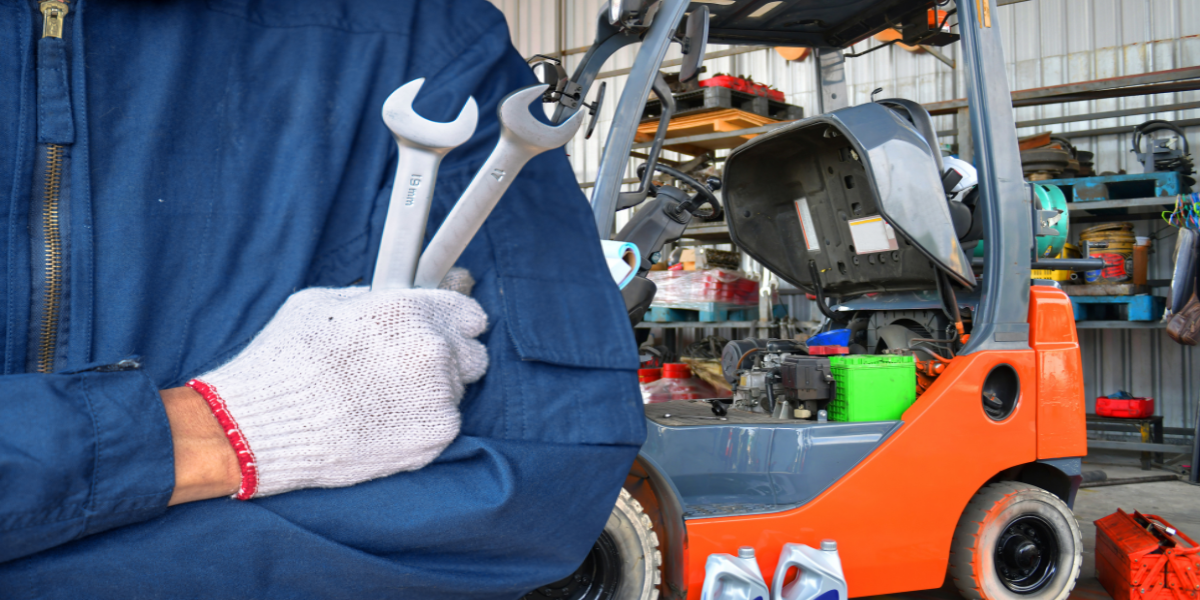
Routine Forklift Maintenance
Forklifts are specialized heavy-duty machines that empower warehouse teams to operate more efficiently. But this type of equipment isn’t cheap. Most will cost thousands, if not tens of thousands, of dollars.
Put simply, if you want to protect your investment and extend its lifetime value, you need to perform routine forklift maintenance.
But what does that look like and why does it matter?
Let’s discuss.
The Importance of Preventative Maintenance
For forklifts, every hour of usage brings that piece of heavy machinery closer to its eventual decommission or sale. If you want to maximize the value of the forklifts in your warehouse fleet, your goal should be to extend the operational lifetime however possible.
When it comes to maintenance, you have one of two pathways: reactive or proactive.
With a reactive posture—the “if it ain’t broke don’t fix it” approach—you operate at the mercy of the machine, waiting for problems to arise, and then fixing them as they crop up.
But, with a proactive posture—one where you systematically inspect the vehicles, identify potential problems, and address them post haste—you can nip small problems in the bud so they don’t become more expensive later on. As ABM notes:
“A preventive maintenance program is an important part of successful facility management. It keeps equipment operating efficiently, increases the safety of your employees, and helps you avoid large and costly repairs down the road.”
Put simply, there are multiple advantages to performing preventative maintenance on your forklifts, including:
- Improved equipment efficiency
- Enhanced equipment performance
- Reduced downtime
- Safer work conditions
- Strengthened company reputation
- Increased resale value
- Reduced vehicle upkeep expenses
OSHA Standards
Routine maintenance isn’t just responsible vehicle ownership, it’s also legally required by OSHA.
In particular, two standards cover the maintenance, repair, and safety of this type of heavy machinery:
- OSHA Standard 1910.178(Q)(7) – States: “Industrial trucks shall be examined before being placed in service, and shall not be placed in service if the examination shows any condition adversely affecting the safety of the vehicle. Such examinations shall be made at least daily. Where industrial trucks are used on a round-the-clock basis, they shall be examined after each shift. Defects, when found, shall be immediately reported and corrected.”
- OSHA Standard 1910.178(P)(1) – States: “If at any time a powered industrial truck is found to be in need of repair, defective, or in any way unsafe, the truck shall be taken out of service until it has been restored to safe operating condition.”
Failure to abide by these rules could expose your business to legal liability. Furthermore, OSHA could levy fines, fees, and penalties against the guilty party.
What Does Routine Forklift Maintenance Look Like?
Naturally, recommended maintenance activities will differ depending on the vehicle’s engine type (combustion or EV), forklift model, and brand. That said, for general routine maintenance, there are three different types of forklift maintenance and inspection:
1. Daily pre-shift visual inspection – This involves performing quick visual tests to determine:
- Fluid levels
- Visible damage
- Tire condition
- Tire pressure
- Inspection and decal positioning
- Safety device presence
2. Minor inspection – At 6 weeks or 250 hours of operation, you should perform a thorough evaluation of the following systems:
- Engine, transmission, and fuel
- Exhaust and cooling
- Wheels and axles
- Steering and breaks
- Forks, attachment, mast, and chains
- Hydraulics
- Electrical system
- Safety devices
3. Major inspection – Each year or at 2,000 hours of operation, you should enlist the services of a competent forklift mechanic who has 5+ years of experience servicing forklifts and lift trucks. This servicing will typically include:
- Fluids changed
- Safety check inspection
- Mast operation inspection
- Brake inspection
- Compression check
- Clean and check fuel system
- Check hydraulic pressures
- Inspect cooling systems
Browse Machinery at Value Forklifts
If you want to maximize your lift truck investment, proactive routine maintenance must be made a priority. Devoting the extra time will save you money, prevent downtime, and protect the safety of your valuable employees.
Stop searching “forklift maintenance near me.” At Value Forklifts, every one of our used forklifts has been reconditioned and routinely inspected. Our goal is to provide you with high-quality, low-cost machinery that can serve you not just in the near future, but far down the road.
And for that to be possible, routine forklift maintenance is vital.
Want to learn more about how we inspect, service, and repair our fleet?
Contact us today to hear more.

This was both informative and hilarious! For further reading, check out: LEARN MORE. What do others think?